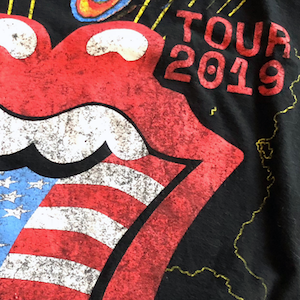The Rolling Stones are at their peak on the remastered 'Sticky Fingers'
By NICK TAVARES
STATIC and FEEDBACK Editor
“At three o’clock in the morning, baby I’m singing my song to you.”
That line is the climax of “I Got the Blues,” where the rhythm meets the soul and Charlie Watts’ drums start hitting just a little harder, where Keith Richards, Mick Taylor and Bill Wyman play like the Stax studio band, where the brass starts to really light things up, where Mick Jagger lets it loose.
Just before that, Jagger begins belting to his direct audience, with “I’m going to tear my hair out” and pleads, “If you don’t believe what I’m saying.” He’s fronting the entire operation like Otis Redding in his prime while the rest of the Rolling Stones match him step for step. “I Got the Blues” may or may not be the definitive song on Sticky Fingers, the Stones’ now-remastered 1971 masterpiece, but picking one signature moment from such an eclectic collection would be to miss the point.
This slice of blinding brilliance is one of many on Sticky Fingers that, when it’s time to take a step back and consider everything within, serves as a reminder that the Rolling Stones in this period were riding a creative high that has rarely been matched. And it all sounds so natural as they play.
Listening to all this now, it’s even more apparent in the wake of this re-release. To these ears, the remastering job on the proper album sounds great. There are piano and percussion flourishes on “Brown Sugar” that are immediately apparent, with the mix remaining faithful to the original record throughout. Those brass punctuations on “I Got the Blues” are right up front, and Richards' occasional backing vocals are present and help keep everything on its proper, ragged note.
Sticky Fingers was a brazen declaration at the time, as the first album released on the band’s new Rolling Stones Records imprint, free of Allen Klein’s management and label. It was an album primarily recorded after the disaster of Altamont and as they started to face the financial reality of having to leave their home country. It was also their first record after the dissolution of the Beatles, leaving the Stones suddenly standing on an open highway and without a shadow.
They took the opportunity to channel the soul, country and blues that were bubbling out of the American south and put a definitive British stamp on the entire affair. Listen to the easy swagger of “Sway” or the rollicking horns on “Bitch” and the sound is of a band that is suddenly more confident than ever, and this was never a shy bunch. Following all the tumult, the Stones went for broke and walked away with a jarring set of songs that sound as immediate and impressive today as they must have 44 years ago.
Offering a window into the creative process are five working tracks on disc two. The famous version of “Brown Sugar” recorded on Richards’ birthday with Eric Clapton on slide guitar is finally given a proper (and intentional) release, while the seeds of the front half of “Can’t You Hear Me Knocking” is on display as a rough, three-minute run. On the same plane, the extended workout through “Bitch” shows the band just teeming with energy, flying through the verses and playing with fire.
But the jewel of this group is an acoustic version of “Wild Horses,” with the electric flairs stripped away to turn the focus on Richards’ shimmering acoustic guitar. Written on the road and recorded in Muscle Shoals, it’s the most brilliant example of the Cosmic American flavor to which Gram Parsons dedicated his life, and the minor fact that it was written by a skinny English guitar player is a funny curiosity. It’s here in its most unadorned beauty, and it’s a stunner.
The live tracks are just as revelatory in their raucous sleaze and stomp. Versions of older numbers of “Live with Me” and “Stray Cat Blues” from the Roundhouse are booming, with the band augmented by Bobby Keys and Jim Price on horns and everyone playing with a renewed purpose before they exit the country. As tight and menacing as Richards and Taylor sound on guitar, it’s actually Jagger and Watts who take center stage here. Charlie is as in the groove as he’s ever been behind the kit, playing with a swing that seems to be driving the guitarists, with snare hits that crackle as they snap. In front of it all, Jagger sings with a raw delivery that isn’t at all as concerned with the technical mastery he’d obsess over later in his career. Part scream, part swagger, he’s as dangerous as James Brown in his prime as he belts out his sleazy odes.
On the third disc that’s available on some versions, we get a full version of this in a complete show at Leeds University. All but the first two tracks have been floating around on high-quality bootlegs for years, but this version from the source obviously tops them all, and the opening “Jumpin’ Jack Flash” and “Live With Me” are finally available here as well. “Dead Flowers” gets a rare live airing and is the star, with the country flavor spun on its edge with electricity.
All this basically serves as a small treasure chest for Stones fans, and it serves its purpose in augmenting the fiery genius that Sticky Fingers was in its time and remains today. This was not a band resting on laurels or spinning directionless. They weren’t even attempting to make a statement, necessarily. Sticky Fingers, both the original version and this deluxe package, merely captures a band at a creative peak few could ever dream.
It was certainly no exaggeration that they were the greatest band in the world in 1971. Further, this edition of Sticky Fingers could convincingly argue that no band has ever been as good as the Stones were in this moment.
E-mail Nick Tavares at nick@staticandfeedback.com















